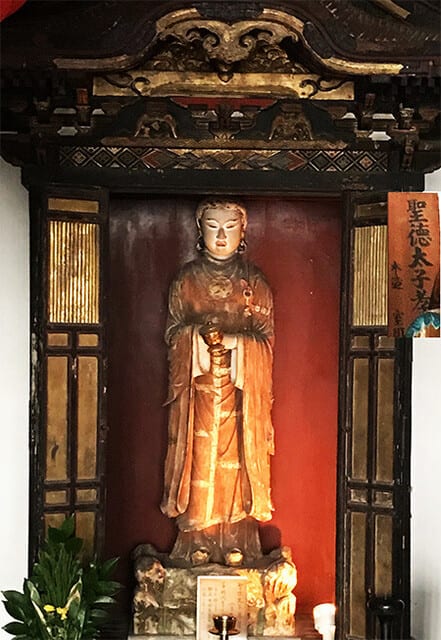


かつては広大な伽藍を誇っていたとされる飛鳥寺。
創建時の施主である蘇我氏の滅亡と共に歴史の中心から離れていった。
しかし断片的な情報からはいろいろな示唆が得られ面白い。
写真の上は「聖徳太子孝養像」と名のある厨子に収められた立像。
16歳のときの太子が親の用明天皇の病気平癒を祈った立像とされる。
紅顔の美少年ふうで女子には胸キュンなのかもしれない(笑)。
聖徳太子という人物は日本史の中で格別の地位を占めている。
皇位というのはさまざまな政治的思惑がからんで決定されたものなので、
摂政として政治を裁断した人物でありながら自らは天皇にはならなかった。
為政者・政治家としてその後の日本史に
かなり決定的な要因となった仏教導入期を先導した象徴として
ながく尊崇を集めてきたということなのでしょうか。
かれ自身がある種の神格化の対象になったのでしょう。
こういう立像が飛鳥寺に残されているということは
蘇我氏との深いつながりを物語っているのでしょう。
一方で下の写真は、現在の金堂中心の寺域から離れた
「西門跡」に置かれた銘板です。興味深い事実もあったので以下記載。
〜飛鳥寺は西暦588年につくり始められた日本最初の寺。塔を中心に
東西に3つの金堂が建っていた。(中略)寺の西側には飛鳥の檜舞台
「欅(ケヤキ)の木の広場」があった。中大兄皇子と藤原鎌足はここでの
蹴鞠の会で出会って645年の乙巳の変・大化の改新を成し遂げた。
このとき2人は飛鳥寺に陣を構え、西門から甘樫丘の蘇我氏をにらんでいた。
672年の壬申の乱の時には広場を軍隊が埋め尽くしていた。
その後も外国や遠方からの使者を歓迎する宴会の場となり、
噴水が置かれ、歌や踊りが満ちあふれた。飛鳥の歴史舞台。〜
宗教施設というのは回りを塀で囲み、場合によっては壕なども巡らす。
吉野ヶ里の時代でも逆茂木が巡らされた結界内部に広大な領域があるように
寺域という広大空間はしばしば「城郭化」しやすかった。
平和な時期には宗教空間であり、戦時には城郭に使われる。
そういう意味で「日本最初の寺」もそのように利用されたことは示唆的。
片方で涅槃を語り、一方では地獄の修羅も受容する、
宗教と権力の関係を深く教えてくれる気がします。
English version⬇
[Nirvana and hell going back and forth: Japan's first temple, Asuka-dera-6]
Asuka-dera must have once boasted a vast cathedral.
With the destruction of the founding owner, the Soga clan, he moved away from the center of history.
However, it is interesting to get various suggestions from the fragmentary information.
Above the photo is a statue housed in a kitchen named "Prince Shotoku Takayo Statue".
It is said that the prince at the age of 16 prayed for the healing of his parents, Emperor Yōmei's illness.
It may be like a beautiful boy with a red face, and it may be heart-pounding for girls (laughs).
Prince Shotoku occupies a special position in Japanese history.
Since the throne was decided by various political speculations,
Although he was a regent who cut politics, he did not become an emperor himself.
In the subsequent history of Japan as a politician and politician
As a symbol that led the introduction of Buddhism, which became a very decisive factor
Does it mean that he has been revered for a long time?
He would have been the subject of some sort of deification himself.
The fact that such a statue is left at Asuka-dera
It probably shows a deep connection with Mr. Soga.
On the other hand, the photo below is far from the current temple area in the center of the main hall.
It is a name plate placed on the "West Gate Ruins". There were some interesting facts, so I will describe them below.
~ Asuka-dera is the first temple in Japan that was built in 588 AD. Centering on the tower
There were three Kondo in the east and west. (Omitted) Asuka's cypress stage is on the west side of the temple
There was a "zelkova tree open space". The middle and big brother Prince and Fujiwara no Kamatari are here
I met at the Kemari no Kai and achieved the transformation and Taika Reform of Otomi in 645.
At this time, the two of them set up a camp at Asuka-dera and were looking at Mr. Soga of Amakashi-no-oka from the west gate.
At the time of the Jinshin War in 672, the square was filled with troops.
After that, it became a banquet place to welcome messengers from foreign countries and distant places.
A fountain was set up and filled with songs and dances. Asuka's historical stage. ~
Religious facilities are surrounded by walls, and in some cases, moats are also laid out.
Even in the Yoshinogari era, there seems to be a vast area inside the barrier where the abatis trees were laid.
The vast space of the temple area was often easy to "castle".
It is a religious space during peaceful times and is used as a castle during wartime.
In that sense, it is suggestive that "Japan's first temple" was also used in that way.
One talks about Nirvana, and the other accepts Hell's Shura.
I feel that it teaches me the relationship between religion and power.










